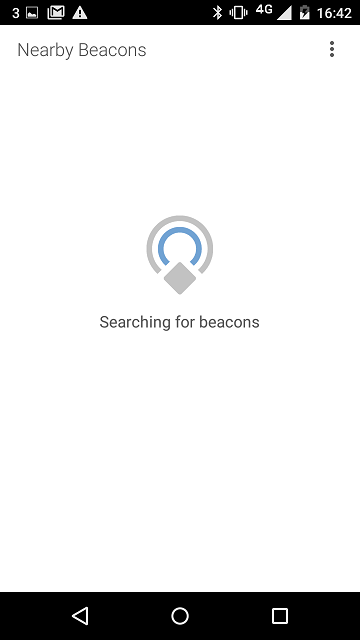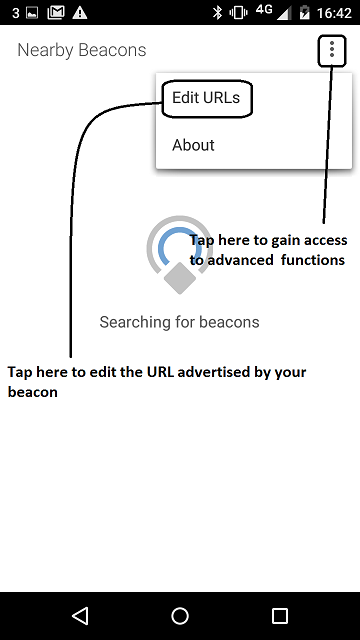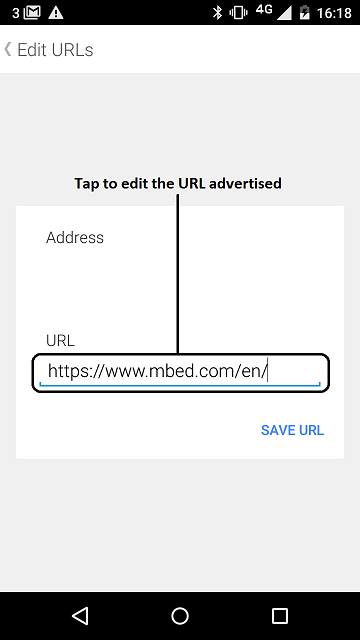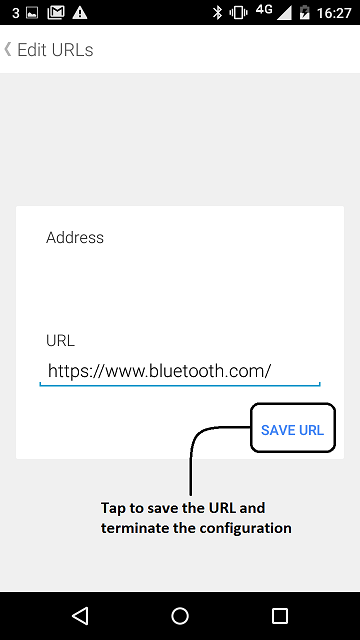Eddystone beacons broadcast a small amount of information, like URLs, to nearby BLE devices. The canonical source for this example lives at https://github.com/ARMmbed/mbed-os-example-ble/tree/master/BLE_EddystoneService
Eddystone beacons broadcast a small amount of information, like URLs, to nearby BLE devices.
The Eddystone Beacon sample application runs in two stages:
- On startup, the Configuration Service (which allows modification of the beacon runs for a user-defined period (default - 30 seconds).
- When the Configuration Service period ends, the Eddystone Service broadcasts advertisement packets.
Running the application
Requirements
You should install the *Physical Web* application on your phone:
Note: It is also possible to use a regular scanner to interract with your Eddystone beacon but it requires knowledge about BLE and Eddystone beacon specification out of the scope of this document.
Hardware requirements are in the main readme.
Building instructions
Building with mbed CLI
If you'd like to use mbed CLI to build this, then you should refer to the main readme. The instructions here relate to using the developer.mbed.org Online Compiler
In order to build this example in the mbed Online Compiler, first import the example using the ‘Import’ button on the right hand side.
Next, select a platform to build for. This must either be a platform that supports BLE, for example the NRF51-DK, or one of the following:
List of platforms supporting Bluetooth Low Energy
Or you must also add a piece of hardware and the supporting library that includes a Bluetooth Low Energy driver for that hardware, for example the K64F or NUCLEO_F401RE with the X-NUCLEO-IDB05A1
List of components supporting Bluetooth Low Energy.
Once you have selected your platform, compile the example and drag and drop the resulting binary onto your board.
For general instructions on using the mbed Online Compiler, please see the mbed Handbook
Working with nRF51-based 16K targets
Because of memory constraints, you can't use the SoftDevice 130 (S130) to build for nRF51-based 16K targets. If you are using these targets, then before building:
- Open the ``config.json`` file in this sample.
- Change ``soft device`` to ``S110``.
- Save.
You can now build for nRF51-based 16K targets.
Setting up the beacon
By default, the beacon directs to the url ``http://mbed.org``. You can change this to your own URL in two ways:
- Manually edit the code in ``main.cpp`` in your copy of the sample.
- Build and run the application's default code as explained in the building instructions. When the beacon starts up, the Configuration Service runs for 30 seconds (this is the default value; you can change it in ``main.cpp``). While the Configuration Service runs, you can use a BLE scanner on your phone to edit the values the service presents.
Checking for success
- Build the application and install it on your board as explained in the building instructions.
- Open the *Physical Web* application on your phone. It will start to search for nearby beacons.

figure 1 Start of the *Physical Web* application version 0.1.856 on Android
- When the beacon starts up, the Configuration Service runs for 30 seconds. During this time it is possible to change the URL advertised by the beacon. It is also important to note that during these 30 seconds, your device will not advertise any URL.

figure 2 How to open the beacon configuration view using the *Physical Web* application version 0.1.856 on Android
- Edit the URL advertised by your beacon.

figure 3 How to edit the URL advertised by your beacon using the *Physical Web* application version 0.1.856 on Android
- Save the URL which will be advertised by your beacon.

figure 4 How to save your beacon configuration and start advertising URL using the *Physical Web* application version 0.1.856 on Android.
- Find your device; it should advertise the URL you have set.

figure 5 Display of URL advertised by your beacon using the *Physical Web* application version 0.1.856 on Android.
Note: You can use the Eddystone Observer sample instead of a phone application.
source/EddystoneService.cpp
- Committer:
- mbed_official
- Date:
- 2017-09-08
- Revision:
- 43:00b5f99e0a15
- Parent:
- 12:b31d7c0f906c
File content as of revision 43:00b5f99e0a15:
/* mbed Microcontroller Library
* Copyright (c) 2006-2015 ARM Limited
*
* Licensed under the Apache License, Version 2.0 (the "License");
* you may not use this file except in compliance with the License.
* You may obtain a copy of the License at
*
* http://www.apache.org/licenses/LICENSE-2.0
*
* Unless required by applicable law or agreed to in writing, software
* distributed under the License is distributed on an "AS IS" BASIS,
* WITHOUT WARRANTIES OR CONDITIONS OF ANY KIND, either express or implied.
* See the License for the specific language governing permissions and
* limitations under the License.
*/
#include "EddystoneService.h"
/* Initialise the EddystoneService using parameters from persistent storage */
EddystoneService::EddystoneService(BLE &bleIn,
EddystoneParams_t ¶msIn,
const PowerLevels_t &radioPowerLevelsIn,
EventQueue &evQ,
uint32_t advConfigIntervalIn) :
ble(bleIn),
operationMode(EDDYSTONE_MODE_NONE),
urlFrame(paramsIn.urlData, paramsIn.urlDataLength),
uidFrame(paramsIn.uidNamespaceID, paramsIn.uidInstanceID),
tlmFrame(paramsIn.tlmVersion),
resetFlag(false),
rawUrlFrame(NULL),
rawUidFrame(NULL),
rawTlmFrame(NULL),
tlmBatteryVoltageCallback(NULL),
tlmBeaconTemperatureCallback(NULL),
uidFrameCallbackHandle(),
urlFrameCallbackHandle(),
tlmFrameCallbackHandle(),
radioManagerCallbackHandle(),
deviceName(DEFAULT_DEVICE_NAME),
eventQueue(evQ)
{
lockState = paramsIn.lockState;
flags = paramsIn.flags;
txPowerMode = paramsIn.txPowerMode;
urlFramePeriod = correctAdvertisementPeriod(paramsIn.urlFramePeriod);
uidFramePeriod = correctAdvertisementPeriod(paramsIn.uidFramePeriod);
tlmFramePeriod = correctAdvertisementPeriod(paramsIn.tlmFramePeriod);
memcpy(lock, paramsIn.lock, sizeof(Lock_t));
memcpy(unlock, paramsIn.unlock, sizeof(Lock_t));
eddystoneConstructorHelper(paramsIn.advPowerLevels, radioPowerLevelsIn, advConfigIntervalIn);
}
/* When using this constructor we need to call setURLData,
* setTMLData and setUIDData to initialise values manually
*/
EddystoneService::EddystoneService(BLE &bleIn,
const PowerLevels_t &advPowerLevelsIn,
const PowerLevels_t &radioPowerLevelsIn,
EventQueue &evQ,
uint32_t advConfigIntervalIn) :
ble(bleIn),
operationMode(EDDYSTONE_MODE_NONE),
urlFrame(),
uidFrame(),
tlmFrame(),
lockState(false),
resetFlag(false),
lock(),
unlock(),
flags(0),
txPowerMode(0),
urlFramePeriod(DEFAULT_URL_FRAME_PERIOD_MSEC),
uidFramePeriod(DEFAULT_UID_FRAME_PERIOD_MSEC),
tlmFramePeriod(DEFAULT_TLM_FRAME_PERIOD_MSEC),
rawUrlFrame(NULL),
rawUidFrame(NULL),
rawTlmFrame(NULL),
tlmBatteryVoltageCallback(NULL),
tlmBeaconTemperatureCallback(NULL),
uidFrameCallbackHandle(),
urlFrameCallbackHandle(),
tlmFrameCallbackHandle(),
radioManagerCallbackHandle(),
deviceName(DEFAULT_DEVICE_NAME),
eventQueue(evQ)
{
eddystoneConstructorHelper(advPowerLevelsIn, radioPowerLevelsIn, advConfigIntervalIn);
}
/* Setup callback to update BatteryVoltage in TLM frame */
void EddystoneService::onTLMBatteryVoltageUpdate(TlmUpdateCallback_t tlmBatteryVoltageCallbackIn)
{
tlmBatteryVoltageCallback = tlmBatteryVoltageCallbackIn;
}
/* Setup callback to update BeaconTemperature in TLM frame */
void EddystoneService::onTLMBeaconTemperatureUpdate(TlmUpdateCallback_t tlmBeaconTemperatureCallbackIn)
{
tlmBeaconTemperatureCallback = tlmBeaconTemperatureCallbackIn;
}
void EddystoneService::setTLMData(uint8_t tlmVersionIn)
{
tlmFrame.setTLMData(tlmVersionIn);
}
void EddystoneService::setURLData(const char *urlDataIn)
{
urlFrame.setURLData(urlDataIn);
}
void EddystoneService::setUIDData(const UIDNamespaceID_t &uidNamespaceIDIn, const UIDInstanceID_t &uidInstanceIDIn)
{
uidFrame.setUIDData(uidNamespaceIDIn, uidInstanceIDIn);
}
EddystoneService::EddystoneError_t EddystoneService::startConfigService(void)
{
if (operationMode == EDDYSTONE_MODE_CONFIG) {
/* Nothing to do, we are already in config mode */
return EDDYSTONE_ERROR_NONE;
} else if (advConfigInterval == 0) {
/* Nothing to do, the advertisement interval is 0 */
return EDDYSTONE_ERROR_INVALID_ADVERTISING_INTERVAL;
}
if (operationMode == EDDYSTONE_MODE_BEACON) {
ble.shutdown();
stopBeaconService();
}
if (!ble.hasInitialized()) {
operationMode = EDDYSTONE_MODE_CONFIG;
ble.init(this, &EddystoneService::bleInitComplete);
/* Set the device name once more */
ble.gap().setDeviceName(reinterpret_cast<const uint8_t *>(deviceName));
return EDDYSTONE_ERROR_NONE;
}
operationMode = EDDYSTONE_MODE_CONFIG;
setupConfigService();
return EDDYSTONE_ERROR_NONE;
}
EddystoneService::EddystoneError_t EddystoneService::startBeaconService(void)
{
if (operationMode == EDDYSTONE_MODE_BEACON) {
/* Nothing to do, we are already in beacon mode */
return EDDYSTONE_ERROR_NONE;
} else if (!urlFramePeriod && !uidFramePeriod && !tlmFramePeriod) {
/* Nothing to do, the period is 0 for all frames */
return EDDYSTONE_ERROR_INVALID_ADVERTISING_INTERVAL;
}
if (operationMode == EDDYSTONE_MODE_CONFIG) {
ble.shutdown();
/* Free unused memory */
freeConfigCharacteristics();
}
if (!ble.hasInitialized()) {
operationMode = EDDYSTONE_MODE_BEACON;
ble.init(this, &EddystoneService::bleInitComplete);
/* Set the device name once more */
ble.gap().setDeviceName(reinterpret_cast<const uint8_t *>(deviceName));
return EDDYSTONE_ERROR_NONE;
}
operationMode = EDDYSTONE_MODE_BEACON;
setupBeaconService();
return EDDYSTONE_ERROR_NONE;
}
EddystoneService::EddystoneError_t EddystoneService::stopCurrentService(void)
{
switch (operationMode) {
case EDDYSTONE_MODE_NONE:
return EDDYSTONE_ERROR_INVALID_STATE;
case EDDYSTONE_MODE_BEACON:
ble.shutdown();
stopBeaconService();
break;
case EDDYSTONE_MODE_CONFIG:
ble.shutdown();
freeConfigCharacteristics();
break;
default:
/* Some error occurred */
error("Invalid EddystonService mode");
break;
}
operationMode = EDDYSTONE_MODE_NONE;
/* Currently on some platforms, the BLE stack handles power management,
* so we should bring it up again, but not configure it.
* Once the system sleep without BLE initialised is fixed, remove this
*/
ble.init(this, &EddystoneService::bleInitComplete);
return EDDYSTONE_ERROR_NONE;
}
ble_error_t EddystoneService::setCompleteDeviceName(const char *deviceNameIn)
{
/* Make sure the device name is safe */
ble_error_t error = ble.gap().setDeviceName(reinterpret_cast<const uint8_t *>(deviceNameIn));
if (error == BLE_ERROR_NONE) {
deviceName = deviceNameIn;
if (operationMode == EDDYSTONE_MODE_CONFIG) {
/* Need to update the advertising packets to the new name */
setupEddystoneConfigScanResponse();
}
}
return error;
}
/* It is not the responsibility of the Eddystone implementation to store
* the configured parameters in persistent storage since this is
* platform-specific. So we provide this function that returns the
* configured values that need to be stored and the main application
* takes care of storing them.
*/
void EddystoneService::getEddystoneParams(EddystoneParams_t ¶ms)
{
params.lockState = lockState;
params.flags = flags;
params.txPowerMode = txPowerMode;
params.urlFramePeriod = urlFramePeriod;
params.tlmFramePeriod = tlmFramePeriod;
params.uidFramePeriod = uidFramePeriod;
params.tlmVersion = tlmFrame.getTLMVersion();
params.urlDataLength = urlFrame.getEncodedURLDataLength();
memcpy(params.advPowerLevels, advPowerLevels, sizeof(PowerLevels_t));
memcpy(params.lock, lock, sizeof(Lock_t));
memcpy(params.unlock, unlock, sizeof(Lock_t));
memcpy(params.urlData, urlFrame.getEncodedURLData(), urlFrame.getEncodedURLDataLength());
memcpy(params.uidNamespaceID, uidFrame.getUIDNamespaceID(), sizeof(UIDNamespaceID_t));
memcpy(params.uidInstanceID, uidFrame.getUIDInstanceID(), sizeof(UIDInstanceID_t));
}
/* Helper function used only once during constructing the object to avoid
* duplicated code.
*/
void EddystoneService::eddystoneConstructorHelper(const PowerLevels_t &advPowerLevelsIn,
const PowerLevels_t &radioPowerLevelsIn,
uint32_t advConfigIntervalIn)
{
/* We cannot use correctAdvertisementPeriod() for this check because the function
* call to get the minimum advertising interval in the BLE API is different for
* connectable and non-connectable advertising.
*/
if (advConfigIntervalIn != 0) {
if (advConfigIntervalIn < ble.gap().getMinAdvertisingInterval()) {
advConfigInterval = ble.gap().getMinAdvertisingInterval();
} else if (advConfigIntervalIn > ble.gap().getMaxAdvertisingInterval()) {
advConfigInterval = ble.gap().getMaxAdvertisingInterval();
} else {
advConfigInterval = advConfigIntervalIn;
}
}
memcpy(radioPowerLevels, radioPowerLevelsIn, sizeof(PowerLevels_t));
memcpy(advPowerLevels, advPowerLevelsIn, sizeof(PowerLevels_t));
/* TODO: Note that this timer is started from the time EddystoneService
* is initialised and NOT from when the device is booted. So app needs
* to take care that EddystoneService is one of the first things to be
* started!
*/
timeSinceBootTimer.start();
/* Set the device name at startup */
ble.gap().setDeviceName(reinterpret_cast<const uint8_t *>(deviceName));
}
/* When changing modes, we shutdown and init the BLE instance, so
* this is needed to complete the initialisation task.
*/
void EddystoneService::bleInitComplete(BLE::InitializationCompleteCallbackContext* initContext)
{
if (initContext->error != BLE_ERROR_NONE) {
/* Initialisation failed */
return;
}
switch (operationMode) {
case EDDYSTONE_MODE_CONFIG:
setupConfigService();
break;
case EDDYSTONE_MODE_BEACON:
setupBeaconService();
break;
case EDDYSTONE_MODE_NONE:
/* We don't need to do anything here, but it isn't an error */
break;
default:
/* Some error occurred */
error("Invalid EddystonService mode");
break;
}
}
void EddystoneService::swapAdvertisedFrame(FrameType frameType)
{
switch(frameType) {
case EDDYSTONE_FRAME_URL:
updateAdvertisementPacket(rawUrlFrame, urlFrame.getRawFrameSize());
break;
case EDDYSTONE_FRAME_UID:
updateAdvertisementPacket(rawUidFrame, uidFrame.getRawFrameSize());
break;
case EDDYSTONE_FRAME_TLM:
updateRawTLMFrame();
updateAdvertisementPacket(rawTlmFrame, tlmFrame.getRawFrameSize());
break;
default:
/* Some error occurred */
error("Frame to swap in does not specify a valid type");
break;
}
}
/* Helper function that calls user-defined functions to update Battery Voltage and Temperature (if available),
* then updates the raw frame data and finally updates the actual advertised packet. This operation must be
* done fairly often because the TLM frame TimeSinceBoot must have a 0.1 secs resolution according to the
* Eddystone specification.
*/
void EddystoneService::updateRawTLMFrame(void)
{
if (tlmBeaconTemperatureCallback != NULL) {
tlmFrame.updateBeaconTemperature((*tlmBeaconTemperatureCallback)(tlmFrame.getBeaconTemperature()));
}
if (tlmBatteryVoltageCallback != NULL) {
tlmFrame.updateBatteryVoltage((*tlmBatteryVoltageCallback)(tlmFrame.getBatteryVoltage()));
}
tlmFrame.updateTimeSinceBoot(timeSinceBootTimer.read_ms());
tlmFrame.constructTLMFrame(rawTlmFrame);
}
void EddystoneService::updateAdvertisementPacket(const uint8_t* rawFrame, size_t rawFrameLength)
{
ble.gap().clearAdvertisingPayload();
ble.gap().accumulateAdvertisingPayload(GapAdvertisingData::BREDR_NOT_SUPPORTED | GapAdvertisingData::LE_GENERAL_DISCOVERABLE);
ble.gap().accumulateAdvertisingPayload(GapAdvertisingData::COMPLETE_LIST_16BIT_SERVICE_IDS, EDDYSTONE_UUID, sizeof(EDDYSTONE_UUID));
ble.gap().accumulateAdvertisingPayload(GapAdvertisingData::SERVICE_DATA, rawFrame, rawFrameLength);
}
void EddystoneService::setupBeaconService(void)
{
/* Initialise arrays to hold constructed raw frames */
if (urlFramePeriod) {
rawUrlFrame = new uint8_t[urlFrame.getRawFrameSize()];
urlFrame.constructURLFrame(rawUrlFrame, advPowerLevels[txPowerMode]);
}
if (uidFramePeriod) {
rawUidFrame = new uint8_t[uidFrame.getRawFrameSize()];
uidFrame.constructUIDFrame(rawUidFrame, advPowerLevels[txPowerMode]);
}
if (tlmFramePeriod) {
rawTlmFrame = new uint8_t[tlmFrame.getRawFrameSize()];
/* Do not initialise because we have to reconstruct every 0.1 secs */
}
/* Configure advertisements */
ble.gap().setTxPower(radioPowerLevels[txPowerMode]);
ble.gap().setAdvertisingType(GapAdvertisingParams::ADV_NON_CONNECTABLE_UNDIRECTED);
ble.gap().setAdvertisingInterval(ble.gap().getMaxAdvertisingInterval());
/* Make sure the queue is currently empty */
advFrameQueue.reset();
/* Setup callbacks to periodically add frames to be advertised to the queue and
* add initial frame so that we have something to advertise on startup */
if (uidFramePeriod) {
advFrameQueue.push(EDDYSTONE_FRAME_UID);
uidFrameCallbackHandle = eventQueue.call_every(
uidFramePeriod,
Callback<void(FrameType)>(this, &EddystoneService::enqueueFrame),
EDDYSTONE_FRAME_UID
);
}
if (tlmFramePeriod) {
advFrameQueue.push(EDDYSTONE_FRAME_TLM);
tlmFrameCallbackHandle = eventQueue.call_every(
tlmFramePeriod,
Callback<void(FrameType)>(this, &EddystoneService::enqueueFrame),
EDDYSTONE_FRAME_TLM
);
}
if (urlFramePeriod) {
advFrameQueue.push(EDDYSTONE_FRAME_URL);
tlmFrameCallbackHandle = eventQueue.call_every(
urlFramePeriod,
Callback<void(FrameType)>(this, &EddystoneService::enqueueFrame),
EDDYSTONE_FRAME_URL
);
}
/* Start advertising */
manageRadio();
}
void EddystoneService::enqueueFrame(FrameType frameType)
{
advFrameQueue.push(frameType);
if (!radioManagerCallbackHandle) {
/* Advertising stopped and there is not callback posted in the scheduler. Just
* execute the manager to resume advertising */
manageRadio();
}
}
void EddystoneService::manageRadio(void)
{
FrameType frameType;
uint32_t startTimeManageRadio = timeSinceBootTimer.read_ms();
/* Signal that there is currently no callback posted */
radioManagerCallbackHandle = 0;
if (advFrameQueue.pop(frameType)) {
/* We have something to advertise */
if (ble.gap().getState().advertising) {
ble.gap().stopAdvertising();
}
swapAdvertisedFrame(frameType);
ble.gap().startAdvertising();
/* Increase the advertised packet count in TLM frame */
tlmFrame.updatePduCount();
/* Post a callback to itself to stop the advertisement or pop the next
* frame from the queue. However, take into account the time taken to
* swap in this frame. */
radioManagerCallbackHandle = eventQueue.call_in(
ble.gap().getMinNonConnectableAdvertisingInterval() - (timeSinceBootTimer.read_ms() - startTimeManageRadio),
Callback<void()>(this, &EddystoneService::manageRadio)
);
} else if (ble.gap().getState().advertising) {
/* Nothing else to advertise, stop advertising and do not schedule any callbacks */
ble.gap().stopAdvertising();
}
}
void EddystoneService::setupConfigService(void)
{
lockStateChar = new ReadOnlyGattCharacteristic<bool>(UUID_LOCK_STATE_CHAR, &lockState);
lockChar = new WriteOnlyArrayGattCharacteristic<uint8_t, sizeof(Lock_t)>(UUID_LOCK_CHAR, lock);
unlockChar = new WriteOnlyArrayGattCharacteristic<uint8_t, sizeof(Lock_t)>(UUID_UNLOCK_CHAR, unlock);
urlDataChar = new GattCharacteristic(UUID_URL_DATA_CHAR, urlFrame.getEncodedURLData(), 0, URL_DATA_MAX, GattCharacteristic::BLE_GATT_CHAR_PROPERTIES_READ | GattCharacteristic::BLE_GATT_CHAR_PROPERTIES_WRITE);
flagsChar = new ReadWriteGattCharacteristic<uint8_t>(UUID_FLAGS_CHAR, &flags);
advPowerLevelsChar = new ReadWriteArrayGattCharacteristic<int8_t, sizeof(PowerLevels_t)>(UUID_ADV_POWER_LEVELS_CHAR, advPowerLevels);
txPowerModeChar = new ReadWriteGattCharacteristic<uint8_t>(UUID_TX_POWER_MODE_CHAR, &txPowerMode);
beaconPeriodChar = new ReadWriteGattCharacteristic<uint16_t>(UUID_BEACON_PERIOD_CHAR, &urlFramePeriod);
resetChar = new WriteOnlyGattCharacteristic<bool>(UUID_RESET_CHAR, &resetFlag);
lockChar->setWriteAuthorizationCallback(this, &EddystoneService::lockAuthorizationCallback);
unlockChar->setWriteAuthorizationCallback(this, &EddystoneService::unlockAuthorizationCallback);
urlDataChar->setWriteAuthorizationCallback(this, &EddystoneService::urlDataWriteAuthorizationCallback);
flagsChar->setWriteAuthorizationCallback(this, &EddystoneService::basicAuthorizationCallback<uint8_t>);
advPowerLevelsChar->setWriteAuthorizationCallback(this, &EddystoneService::basicAuthorizationCallback<PowerLevels_t>);
txPowerModeChar->setWriteAuthorizationCallback(this, &EddystoneService::powerModeAuthorizationCallback);
beaconPeriodChar->setWriteAuthorizationCallback(this, &EddystoneService::basicAuthorizationCallback<uint16_t>);
resetChar->setWriteAuthorizationCallback(this, &EddystoneService::basicAuthorizationCallback<bool>);
charTable[0] = lockStateChar;
charTable[1] = lockChar;
charTable[2] = unlockChar;
charTable[3] = urlDataChar;
charTable[4] = flagsChar;
charTable[5] = advPowerLevelsChar;
charTable[6] = txPowerModeChar;
charTable[7] = beaconPeriodChar;
charTable[8] = resetChar;
GattService configService(UUID_URL_BEACON_SERVICE, charTable, sizeof(charTable) / sizeof(GattCharacteristic *));
ble.gattServer().addService(configService);
ble.gattServer().onDataWritten(this, &EddystoneService::onDataWrittenCallback);
updateCharacteristicValues();
setupEddystoneConfigAdvertisements();
}
void EddystoneService::freeConfigCharacteristics(void)
{
delete lockStateChar;
delete lockChar;
delete unlockChar;
delete urlDataChar;
delete flagsChar;
delete advPowerLevelsChar;
delete txPowerModeChar;
delete beaconPeriodChar;
delete resetChar;
}
void EddystoneService::stopBeaconService(void)
{
/* Free unused memory */
if (rawUrlFrame) {
delete[] rawUrlFrame;
rawUrlFrame = NULL;
}
if (rawUidFrame) {
delete[] rawUidFrame;
rawUidFrame = NULL;
}
if (rawTlmFrame) {
delete[] rawTlmFrame;
rawTlmFrame = NULL;
}
/* Unschedule callbacks */
if (urlFrameCallbackHandle) {
eventQueue.cancel(urlFrameCallbackHandle);
urlFrameCallbackHandle = 0;
}
if (uidFrameCallbackHandle) {
eventQueue.cancel(uidFrameCallbackHandle);
uidFrameCallbackHandle = 0;
}
if (tlmFrameCallbackHandle) {
eventQueue.cancel(tlmFrameCallbackHandle);
tlmFrameCallbackHandle = 0;
}
if (radioManagerCallbackHandle) {
eventQueue.cancel(radioManagerCallbackHandle);
radioManagerCallbackHandle = 0;
}
}
/*
* Internal helper function used to update the GATT database following any
* change to the internal state of the service object.
*/
void EddystoneService::updateCharacteristicValues(void)
{
ble.gattServer().write(lockStateChar->getValueHandle(), reinterpret_cast<uint8_t *>(&lockState), sizeof(bool));
ble.gattServer().write(urlDataChar->getValueHandle(), urlFrame.getEncodedURLData(), urlFrame.getEncodedURLDataLength());
ble.gattServer().write(flagsChar->getValueHandle(), &flags, sizeof(uint8_t));
ble.gattServer().write(beaconPeriodChar->getValueHandle(), reinterpret_cast<uint8_t *>(&urlFramePeriod), sizeof(uint16_t));
ble.gattServer().write(txPowerModeChar->getValueHandle(), &txPowerMode, sizeof(uint8_t));
ble.gattServer().write(advPowerLevelsChar->getValueHandle(), reinterpret_cast<uint8_t *>(advPowerLevels), sizeof(PowerLevels_t));
ble.gattServer().write(lockChar->getValueHandle(), lock, sizeof(PowerLevels_t));
ble.gattServer().write(unlockChar->getValueHandle(), unlock, sizeof(PowerLevels_t));
}
void EddystoneService::setupEddystoneConfigAdvertisements(void)
{
ble.gap().clearAdvertisingPayload();
/* Accumulate the new payload */
ble.gap().accumulateAdvertisingPayload(
GapAdvertisingData::BREDR_NOT_SUPPORTED | GapAdvertisingData::LE_GENERAL_DISCOVERABLE
);
/* UUID is in different order in the ADV frame (!) */
uint8_t reversedServiceUUID[sizeof(UUID_URL_BEACON_SERVICE)];
for (size_t i = 0; i < sizeof(UUID_URL_BEACON_SERVICE); i++) {
reversedServiceUUID[i] = UUID_URL_BEACON_SERVICE[sizeof(UUID_URL_BEACON_SERVICE) - i - 1];
}
ble.gap().accumulateAdvertisingPayload(
GapAdvertisingData::COMPLETE_LIST_128BIT_SERVICE_IDS,
reversedServiceUUID,
sizeof(reversedServiceUUID)
);
ble.gap().accumulateAdvertisingPayload(GapAdvertisingData::GENERIC_TAG);
setupEddystoneConfigScanResponse();
ble.gap().setTxPower(radioPowerLevels[txPowerMode]);
ble.gap().setAdvertisingType(GapAdvertisingParams::ADV_CONNECTABLE_UNDIRECTED);
ble.gap().setAdvertisingInterval(advConfigInterval);
ble.gap().startAdvertising();
}
void EddystoneService::setupEddystoneConfigScanResponse(void)
{
ble.gap().clearScanResponse();
ble.gap().accumulateScanResponse(
GapAdvertisingData::COMPLETE_LOCAL_NAME,
reinterpret_cast<const uint8_t *>(deviceName),
strlen(deviceName)
);
ble.gap().accumulateScanResponse(
GapAdvertisingData::TX_POWER_LEVEL,
reinterpret_cast<uint8_t *>(&advPowerLevels[TX_POWER_MODE_LOW]),
sizeof(uint8_t)
);
}
void EddystoneService::lockAuthorizationCallback(GattWriteAuthCallbackParams *authParams)
{
if (lockState) {
authParams->authorizationReply = AUTH_CALLBACK_REPLY_ATTERR_INSUF_AUTHORIZATION;
} else if (authParams->len != sizeof(Lock_t)) {
authParams->authorizationReply = AUTH_CALLBACK_REPLY_ATTERR_INVALID_ATT_VAL_LENGTH;
} else if (authParams->offset != 0) {
authParams->authorizationReply = AUTH_CALLBACK_REPLY_ATTERR_INVALID_OFFSET;
} else {
authParams->authorizationReply = AUTH_CALLBACK_REPLY_SUCCESS;
}
}
void EddystoneService::unlockAuthorizationCallback(GattWriteAuthCallbackParams *authParams)
{
if (!lockState && (authParams->len == sizeof(Lock_t))) {
authParams->authorizationReply = AUTH_CALLBACK_REPLY_SUCCESS;
} else if (authParams->len != sizeof(Lock_t)) {
authParams->authorizationReply = AUTH_CALLBACK_REPLY_ATTERR_INVALID_ATT_VAL_LENGTH;
} else if (authParams->offset != 0) {
authParams->authorizationReply = AUTH_CALLBACK_REPLY_ATTERR_INVALID_OFFSET;
} else if (memcmp(authParams->data, lock, sizeof(Lock_t)) != 0) {
authParams->authorizationReply = AUTH_CALLBACK_REPLY_ATTERR_INSUF_AUTHORIZATION;
} else {
authParams->authorizationReply = AUTH_CALLBACK_REPLY_SUCCESS;
}
}
void EddystoneService::urlDataWriteAuthorizationCallback(GattWriteAuthCallbackParams *authParams)
{
if (lockState) {
authParams->authorizationReply = AUTH_CALLBACK_REPLY_ATTERR_INSUF_AUTHORIZATION;
} else if (authParams->offset != 0) {
authParams->authorizationReply = AUTH_CALLBACK_REPLY_ATTERR_INVALID_OFFSET;
} else {
authParams->authorizationReply = AUTH_CALLBACK_REPLY_SUCCESS;
}
}
void EddystoneService::powerModeAuthorizationCallback(GattWriteAuthCallbackParams *authParams)
{
if (lockState) {
authParams->authorizationReply = AUTH_CALLBACK_REPLY_ATTERR_INSUF_AUTHORIZATION;
} else if (authParams->len != sizeof(uint8_t)) {
authParams->authorizationReply = AUTH_CALLBACK_REPLY_ATTERR_INVALID_ATT_VAL_LENGTH;
} else if (authParams->offset != 0) {
authParams->authorizationReply = AUTH_CALLBACK_REPLY_ATTERR_INVALID_OFFSET;
} else if (*((uint8_t *)authParams->data) >= NUM_POWER_MODES) {
authParams->authorizationReply = AUTH_CALLBACK_REPLY_ATTERR_WRITE_NOT_PERMITTED;
} else {
authParams->authorizationReply = AUTH_CALLBACK_REPLY_SUCCESS;
}
}
template <typename T>
void EddystoneService::basicAuthorizationCallback(GattWriteAuthCallbackParams *authParams)
{
if (lockState) {
authParams->authorizationReply = AUTH_CALLBACK_REPLY_ATTERR_INSUF_AUTHORIZATION;
} else if (authParams->len != sizeof(T)) {
authParams->authorizationReply = AUTH_CALLBACK_REPLY_ATTERR_INVALID_ATT_VAL_LENGTH;
} else if (authParams->offset != 0) {
authParams->authorizationReply = AUTH_CALLBACK_REPLY_ATTERR_INVALID_OFFSET;
} else {
authParams->authorizationReply = AUTH_CALLBACK_REPLY_SUCCESS;
}
}
/*
* This callback is invoked when a GATT client attempts to modify any of the
* characteristics of this service. Attempts to do so are also applied to
* the internal state of this service object.
*/
void EddystoneService::onDataWrittenCallback(const GattWriteCallbackParams *writeParams)
{
uint16_t handle = writeParams->handle;
if (handle == lockChar->getValueHandle()) {
memcpy(lock, writeParams->data, sizeof(Lock_t));
/* Set the state to be locked by the lock code (note: zeros are a valid lock) */
lockState = true;
ble.gattServer().write(lockChar->getValueHandle(), lock, sizeof(PowerLevels_t));
ble.gattServer().write(lockStateChar->getValueHandle(), reinterpret_cast<uint8_t *>(&lockState), sizeof(bool));
} else if (handle == unlockChar->getValueHandle()) {
/* Validated earlier */
lockState = false;
ble.gattServer().write(unlockChar->getValueHandle(), unlock, sizeof(PowerLevels_t));
ble.gattServer().write(lockStateChar->getValueHandle(), reinterpret_cast<uint8_t *>(&lockState), sizeof(bool));
} else if (handle == urlDataChar->getValueHandle()) {
urlFrame.setEncodedURLData(writeParams->data, writeParams->len);
ble.gattServer().write(urlDataChar->getValueHandle(), urlFrame.getEncodedURLData(), urlFrame.getEncodedURLDataLength());
} else if (handle == flagsChar->getValueHandle()) {
flags = *(writeParams->data);
ble.gattServer().write(flagsChar->getValueHandle(), &flags, sizeof(uint8_t));
} else if (handle == advPowerLevelsChar->getValueHandle()) {
memcpy(advPowerLevels, writeParams->data, sizeof(PowerLevels_t));
ble.gattServer().write(advPowerLevelsChar->getValueHandle(), reinterpret_cast<uint8_t *>(advPowerLevels), sizeof(PowerLevels_t));
} else if (handle == txPowerModeChar->getValueHandle()) {
txPowerMode = *(writeParams->data);
ble.gattServer().write(txPowerModeChar->getValueHandle(), &txPowerMode, sizeof(uint8_t));
} else if (handle == beaconPeriodChar->getValueHandle()) {
uint16_t tmpBeaconPeriod = correctAdvertisementPeriod(*((uint16_t *)(writeParams->data)));
if (tmpBeaconPeriod != urlFramePeriod) {
urlFramePeriod = tmpBeaconPeriod;
ble.gattServer().write(beaconPeriodChar->getValueHandle(), reinterpret_cast<uint8_t *>(&urlFramePeriod), sizeof(uint16_t));
}
} else if (handle == resetChar->getValueHandle() && (*((uint8_t *)writeParams->data) != 0)) {
/* Reset characteristics to default values */
flags = 0;
txPowerMode = TX_POWER_MODE_LOW;
urlFramePeriod = DEFAULT_URL_FRAME_PERIOD_MSEC;
urlFrame.setURLData(DEFAULT_URL);
memset(lock, 0, sizeof(Lock_t));
ble.gattServer().write(urlDataChar->getValueHandle(), urlFrame.getEncodedURLData(), urlFrame.getEncodedURLDataLength());
ble.gattServer().write(flagsChar->getValueHandle(), &flags, sizeof(uint8_t));
ble.gattServer().write(txPowerModeChar->getValueHandle(), &txPowerMode, sizeof(uint8_t));
ble.gattServer().write(beaconPeriodChar->getValueHandle(), reinterpret_cast<uint8_t *>(&urlFramePeriod), sizeof(uint16_t));
ble.gattServer().write(lockChar->getValueHandle(), lock, sizeof(PowerLevels_t));
}
}
uint16_t EddystoneService::correctAdvertisementPeriod(uint16_t beaconPeriodIn) const
{
/* Re-map beaconPeriod to within permissible bounds if necessary. */
if (beaconPeriodIn != 0) {
if (beaconPeriodIn < ble.gap().getMinNonConnectableAdvertisingInterval()) {
return ble.gap().getMinNonConnectableAdvertisingInterval();
} else if (beaconPeriodIn > ble.gap().getMaxAdvertisingInterval()) {
return ble.gap().getMaxAdvertisingInterval();
}
}
return beaconPeriodIn;
}
void EddystoneService::setURLFrameAdvertisingInterval(uint16_t urlFrameIntervalIn)
{
if (urlFrameIntervalIn == urlFramePeriod) {
/* Do nothing */
return;
}
/* Make sure the input period is within bounds */
urlFramePeriod = correctAdvertisementPeriod(urlFrameIntervalIn);
if (operationMode == EDDYSTONE_MODE_BEACON) {
if (urlFrameCallbackHandle) {
eventQueue.cancel(urlFrameCallbackHandle);
} else {
/* This frame was just enabled */
if (!rawUidFrame && urlFramePeriod) {
/* Allocate memory for this frame and construct it */
rawUrlFrame = new uint8_t[urlFrame.getRawFrameSize()];
urlFrame.constructURLFrame(rawUrlFrame, advPowerLevels[txPowerMode]);
}
}
if (urlFramePeriod) {
/* Currently the only way to change the period of a callback
* is to cancel it and reschedule
*/
urlFrameCallbackHandle = eventQueue.call_every(
urlFramePeriod,
Callback<void(FrameType)>(this, &EddystoneService::enqueueFrame),
EDDYSTONE_FRAME_URL
);
} else {
urlFrameCallbackHandle = 0;
}
} else if (operationMode == EDDYSTONE_MODE_CONFIG) {
ble.gattServer().write(beaconPeriodChar->getValueHandle(), reinterpret_cast<uint8_t *>(&urlFramePeriod), sizeof(uint16_t));
}
}
void EddystoneService::setUIDFrameAdvertisingInterval(uint16_t uidFrameIntervalIn)
{
if (uidFrameIntervalIn == uidFramePeriod) {
/* Do nothing */
return;
}
/* Make sure the input period is within bounds */
uidFramePeriod = correctAdvertisementPeriod(uidFrameIntervalIn);
if (operationMode == EDDYSTONE_MODE_BEACON) {
if (uidFrameCallbackHandle) {
/* The advertisement interval changes, update the periodic callback */
eventQueue.cancel(uidFrameCallbackHandle);
} else {
/* This frame was just enabled */
if (!rawUidFrame && uidFramePeriod) {
/* Allocate memory for this frame and construct it */
rawUidFrame = new uint8_t[uidFrame.getRawFrameSize()];
uidFrame.constructUIDFrame(rawUidFrame, advPowerLevels[txPowerMode]);
}
}
if (uidFramePeriod) {
/* Currently the only way to change the period of a callback
* is to cancel it and reschedule
*/
uidFrameCallbackHandle = eventQueue.call_every(
uidFramePeriod,
Callback<void(FrameType)>(this, &EddystoneService::enqueueFrame),
EDDYSTONE_FRAME_UID
);
} else {
uidFrameCallbackHandle = 0;
}
}
}
void EddystoneService::setTLMFrameAdvertisingInterval(uint16_t tlmFrameIntervalIn)
{
if (tlmFrameIntervalIn == tlmFramePeriod) {
/* Do nothing */
return;
}
/* Make sure the input period is within bounds */
tlmFramePeriod = correctAdvertisementPeriod(tlmFrameIntervalIn);
if (operationMode == EDDYSTONE_MODE_BEACON) {
if (tlmFrameCallbackHandle) {
/* The advertisement interval changes, update periodic callback */
eventQueue.cancel(tlmFrameCallbackHandle);
} else {
/* This frame was just enabled */
if (!rawTlmFrame && tlmFramePeriod) {
/* Allocate memory for this frame and construct it */
rawTlmFrame = new uint8_t[tlmFrame.getRawFrameSize()];
/* Do not construct the TLM frame because this changes every 0.1 seconds */
}
}
if (tlmFramePeriod) {
/* Currently the only way to change the period of a callback
* is to cancel it and reschedule
*/
tlmFrameCallbackHandle = eventQueue.call_every(
tlmFramePeriod,
Callback<void(FrameType)>(this, &EddystoneService::enqueueFrame),
EDDYSTONE_FRAME_TLM
);
} else {
tlmFrameCallbackHandle = 0;
}
}
}
 mbed-os-examples
mbed-os-examples